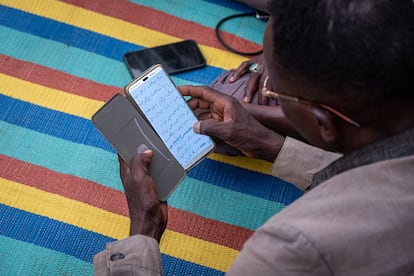
If he had stayed in El Fasher a few more days, Mohamed Usman Hassan (42) probably wouldn’t be sitting here now, on a mat in the bombed-out Sudanese capital, Khartoum. He, his wife and two children escaped in a miraculous way: less than a week before the paramilitary Rapid Support Forces (RSF) attacked North Darfur’s capital, he managed to convince a soldier to let him pass through the main checkpoint leading out of the city. He carried his little daughter in a wheelbarrow.
“I said I had to leave the city to farm,” the man says. He is very thin and his rectangular glasses are too large, causing them to constantly slide down his nose. “I have no idea why they let us go,” Hassan says with a nervous laugh. “It was a poor excuse. But I believe that God was with us that day, that God had decided that it was not yet time to leave… Alhamdulillah“, he says in Arabic. After the first checkpoint, he says he had to pass through 16 more before entering government army territory and that along the way the soldiers confiscated all his belongings.
The outbreak of conflict in April 2023 – caused by a power struggle between the army chief, Abdel Fattah al Burhan, and the leader of the Rapid Support Forces, Mohamed Hamdan Dagalo – accelerated a mass exodus and brought Sudan to collapse. UNHCR, the United Nations refugee agency, estimates that nearly 12 million people have been displaced and that the country is facing its worst humanitarian crisis in decades, with several regions hit by famine. Casualty figures remain imprecise, but various estimates put the death toll in the hundreds of thousands.
In Darfur the situation is so serious that famine has been declared in many places. Hassan also saw him in El Fasher. “We had to try something, we had to leave. The situation in the city had become unsustainable”, he sighs. The little food left had become so expensive that his family could no longer afford it. It shows a photo of a healthy, robust man with muscles and a small belly: this is how Hassan looked before the siege of the city.
We had to try something, we had to go. The situation in the city had become unsustainable
Mohamed Usman Hassan, survivor of the siege of El Fasher
“People boiled animal skins and ate the water like soup,” Hassan explains, shaking his head. The elderly, in particular, were dying for lack of food and medical care. “We kept burying people,” the man murmurs. “Dozens a day.” Meanwhile, their children were losing weight. “It was inhumane.”
The United Nations High Commissioner for Human Rights, Volker Türk, denounced last week the “crimes of extreme gravity” committed in El Fasher during the 18 months that the Rapid Support Forces besieged the city, and even after they managed to take it on 26 October. The US State Department has accused paramilitaries of committing genocide in North Darfur against non-Arab groups. The RSF denies this accusation.
“The world has turned its back on us”
On October 26, paramilitary forces announced that they had taken control of El Fasher. Internet and phone lines were cut. The only videos released were recorded and published by the RSF soldiers themselves. The images apparently showed them shooting people indiscriminately. The international community, which for years had warned of a mass extermination of hundreds of thousands of refugees in and around El Fasher, condemned the attacks but did not intervene.
“The world has turned its back on us,” says Hassan. For months, people were dying, he explains. “In recent times the attacks have increased. There were drone attacks and bombings. People were dying in places where they had breakfast, in mosques… The bombings happened early in the morning, around four in the morning.”

Hassan pauses. “In recent months, soldiers have entered the camp more and more times. They attacked us with weapons and sticks and stole our things. The youngest were raped, kidnapped and persecuted. The women who left the camp to collect firewood never returned,” he complains.
He sighs, pauses and composes himself. “I read in the media that thousands have died,” he says. “That may be true. But to this we must add the deaths of the last year and a half. What happened to El Fasher is terrible.”
On November 14, the United Nations Human Rights Council unanimously approved a new independent investigation into massacres in the Sudanese city of El Fasher. “Our calls for attention were not heeded. The bloodstains on the ground of El Fasher were photographed from space. The stain on the reputation of the international community is less visible, but no less damaging,” Türk said during an emergency meeting in Geneva. The findings could be shared with the International Criminal Court.
The bloodstains on the floor of El Fasher were photographed from space
Volker Türk, United Nations High Commissioner for Human Rights
Mohamed Usman Hassan takes out his phone from the gray suit he is wearing that he bought a few days ago. “Now we just have to watch in dismay what is happening to El Fasher,” he says darkly. He watches the videos friends and family sent him of people being killed. “People are lying dead or dying on the ground everywhere,” he explains. He points to the trench that the RSF had dug around the city. “Those holes in the ground are now full of bodies,” he grieves.
“I read everywhere that only about 7,000 people have fled since the attack began,” he says, his voice trembling. “But what happened to all those other people?” he asks worriedly, since many of his friends and family were unable to escape.
He looks up his eighty-year-old father’s number on his phone. The call rings briefly, but then hangs up. “Still there,” Hassan says softly. “He was too weak to take him with us to Khartoum.” And he bursts into sobs: “I pray to God every day that my father survives this hell, but I think the RSF killed him a long time ago.”




